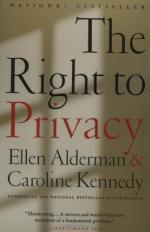|
This section contains 1,517 words (approx. 6 pages at 300 words per page) |

|
Laws and guidelines concerning who should have access to a child's privacy.
Privacy is viewed in most democratic societies as a necessary element in the development of healthy, active individuals. The Fourth Amendment to the U.S. Constitution protects "the right of the people to be secure in their persons, houses, papers, and effects, against unreasonable searches and seizures." The amendment allows for search and seizure "upon probable cause, supported by oath or affirmation, and particularly describing the place to be searched, and the persons or things to seized." Many psychologists recognize that privacy is a cornerstone of a free society. In fact, prisons systematically eliminate privacy for their inmates to reinforce the fact that they have lost the privilege of control over their environment.
Children do not begin to understand issues of privacy until around the age...
|
This section contains 1,517 words (approx. 6 pages at 300 words per page) |

|


